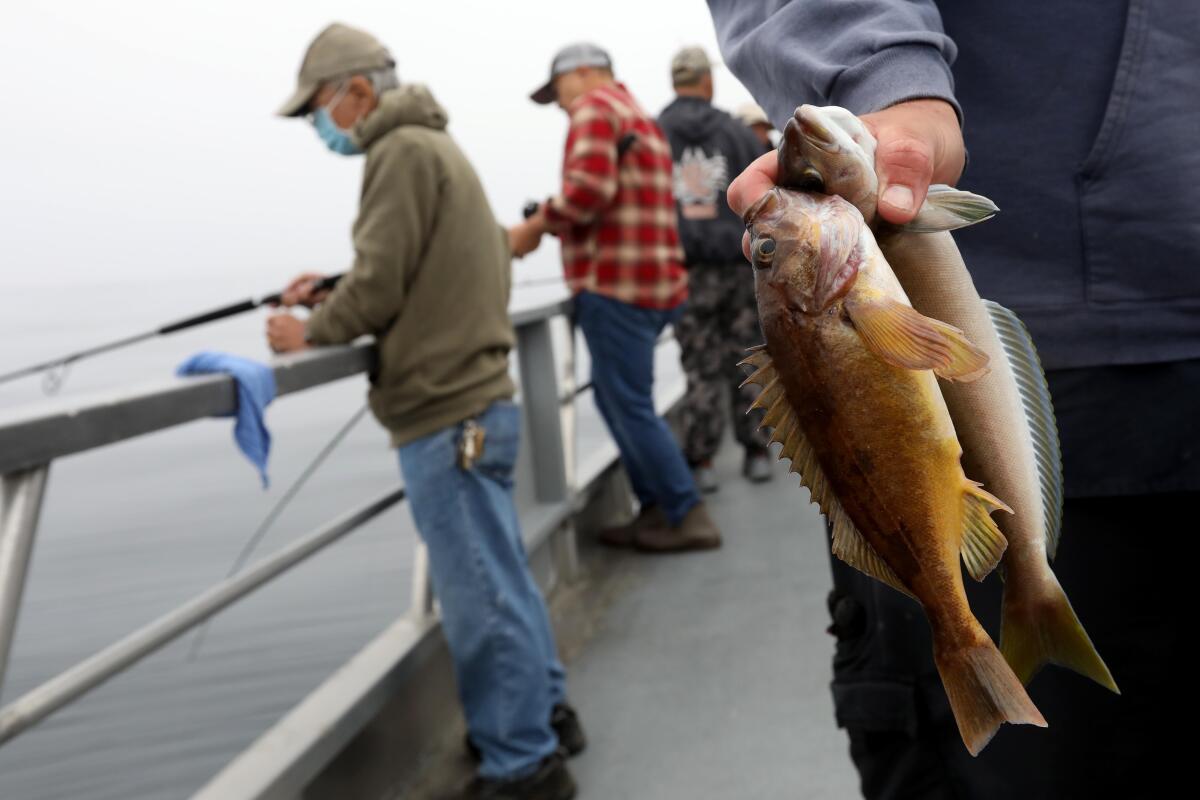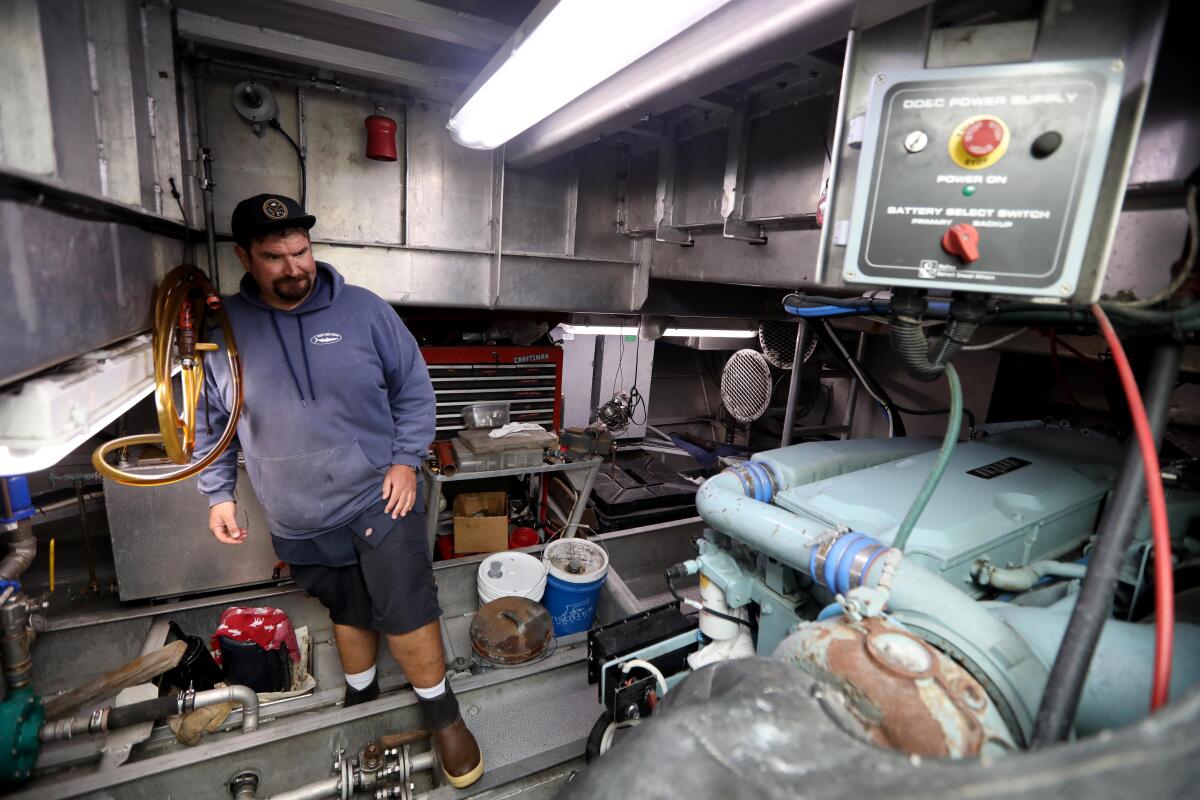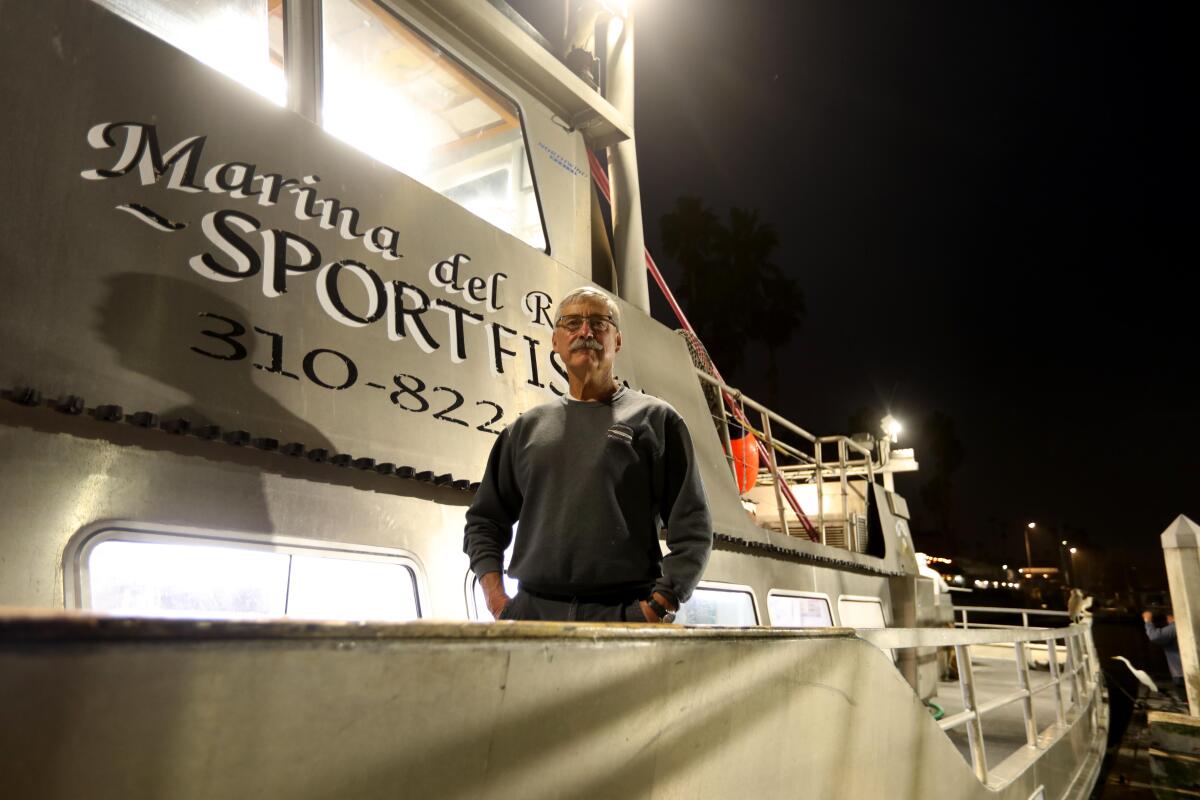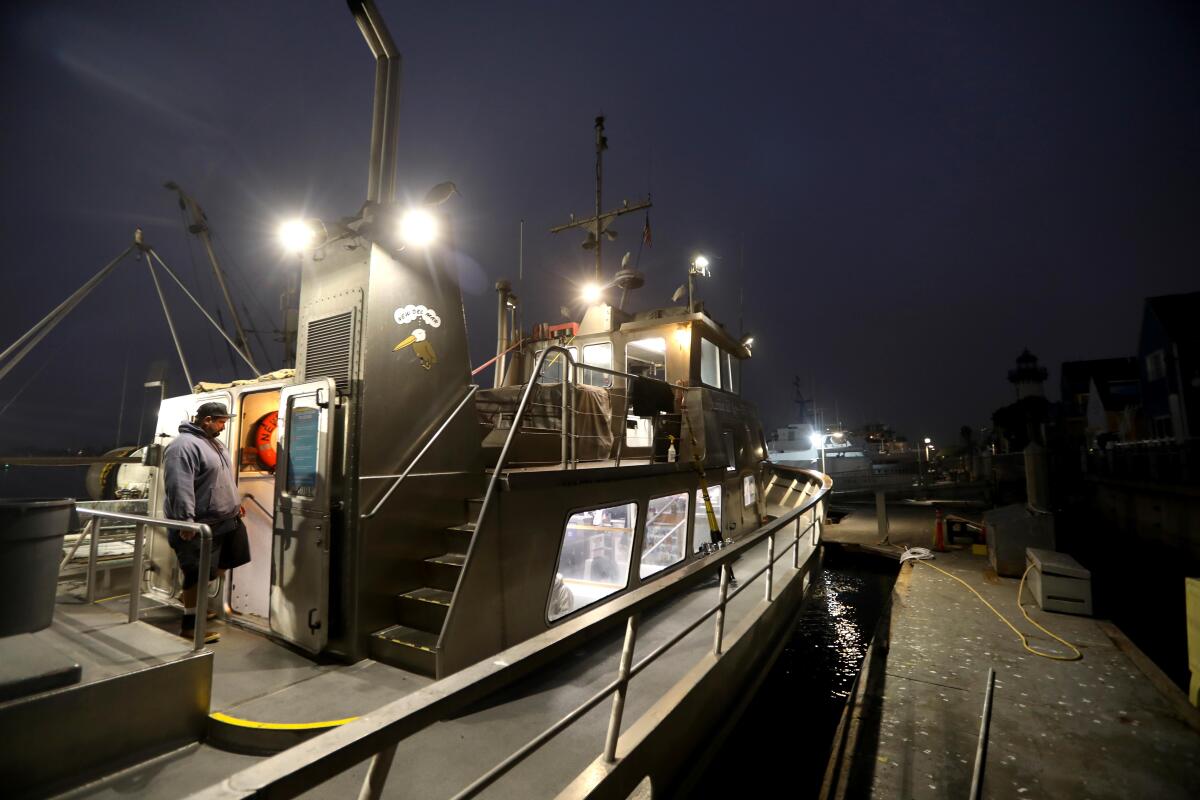A sport-fishing boat pollutes ‘as much as 162 school buses.’ Will boat businesses survive regulation?

California’s air pollution regulators have clamped down on big-rig trucks, buses, cargo ships and various manufacturers.
Their latest target is a far smaller industry: sport-fishing and whale-watching operators, whose aging diesel-powered boats are responsible for what officials say is an outsize amount of dangerous pollution that lingers over the state’s marinas and bays.
The California Air Resources Board meets Friday to consider a measure that would require sport-fishing, whale-watching and other excursion boat owners to install the newest and cleanest diesel engines and potentially also a filter to reduce exhaust pipe emissions.
The boat owners are mostly mom-and-pop businesses that cater to blue-collar anglers and families. They say that they don’t have the finances — unlike other big businesses — to meet the proposed regulations and that many may be forced to close up shop.
“I’m terrified. I’m supposed to learn a new trade now?” said Jeff Jessop, 46, part owner of three fishing boats and a landing in San Pedro who has been in the business since he was a teenager working as a deckhand. “I thought this was my future and my retirement.”
Industries including big-rig truck companies and cargo ship operators have voiced fears before that environmental regulations will cost workers jobs and shut down companies. Business experts and researchers generally say environmental regulations have had very little to do with cutting the overall number of jobs in the economy. Instead, they say, regulations often shift jobs from one industry to another — away from petroleum industries and toward clean-energy businesses, for example.
Regulations do increase the cost of doing business, cutting into profits, experts say.
“There could well be some changes in who is operating the businesses in this sector,” said Cary Coglianese, a law professor and head of the University of Pennsylvania’s program on regulation. “Will this sector disappear completely? I find that hard to imagine.”
If the boats are polluting the air for nearby residents, Coglianese said, it only makes sense that they pay to relieve that burden.
“You could say society is subsidizing these businesses,” he said. “We are incurring the cost of this harmful pollution.”
In the case of mom-and-pop businesses such as boat operators, environmental regulations often force the industry to consolidate to a smaller number of better-funded companies willing to pay for the environmental upgrades.
“The industry survives but it’s the composition that changes,” said Shon Hiatt, a USC professor of management and organization. “Regulations generally do reduce competition and increase the cost.”

Many wood and fiberglass boats — the majority of excursion boats in the state — can’t accommodate the proposed new engines and filters, and so must be replaced with metal vessels that cost $2 million to $5 million, according to state officials and boat owners. Boat owners say the engines, called Tier 3 and Tier 4, and filters are too large and heavy, and generate so much heat that they can’t be installed in most existing vessels.
They also say that the required particulate filter can get clogged under certain conditions, forcing boat captains to cut the engines and let the boat drift while the crew tries to unclog the filter.
To pay off the cost of a new boat with a cleaner-burning engine, Air Resources Board representatives suggest boat owners raise the daily price of a sport-fishing or whale-watching trip — which now ranges from about $55 to $110 — by about $40 per person.
“It’s a very ugly situation for this government to be dictating very unrealistic dictates on the people,” said Rick Oefinger, president of Marina del Rey Sportfishing in that community, where he operates six boats and employs 15 workers.
A second and final vote on the proposed regulation is expected in the spring. If adopted, it would take effect in 2023, but boat owners who have financial difficulties meeting the deadline may request postponing compliance until as late as 2034.
The regulation is part of a larger state effort that began in 2007 to reduce emissions generated at California’s busy ports and marinas, among the nation’s largest.
Taken together, they are projected to cut at least 1,560 tons of diesel emissions between 2023 and 2038, the equivalent of the emissions spewed by 246,000 heavy-duty diesel trucks traveling from Los Angeles to Sacramento every day for a year, according to the Air Resources Board.
In the San Pedro area, the Air Resources Board estimates that sport-fishing, whale-watching and other daily excursion boats generate 21% of all emissions, the third-biggest source of air pollution in the area. One sport-fishing boat generates about as much pollution as 162 five-year-old school buses, the state agency says.
“Harbor craft are one of the top three contributors to emissions that raise cancer risks around port and marine facilities,” said Bonnie Soriano, chief of the Freight Activity Branch at the California Air Resources Board. “This [regulation] reduces the risk of cancer from emissions for almost 15 million residents.”
The proposed regulation is estimated to avoid 531 premature deaths, 161 hospital admissions and 236 hospital visits over the next decade or so, according to the Air Resources Board.
The state agency is considering similar emission regulations for commercial fishing operations, which operate more than 1,000 boats in the state. If it passes, that program won’t take effect until 2035. The Air Resources Board plans to give commercial fishing boat owners extra time to comply because agency officials say the businesses don’t have the same ability to pass on the cost of new engines and boats to their customers.

Air Resources Board officials acknowledge that the regulation will force many boat owners to replace their boats with new vessels. They note that the average boat used in California for sport fishing and whale watching is 45 years old and will need replacing eventually. They reject claims that the particulate filters are prone to clogging.
“We assume that a majority if not all sport-fishing boats have to be replaced to comply,” said David Quiros, manager of the freight technology section at the Air Resources Board.
When the Air Resources Board imposed similar emission regulations on big-rig trucks in 2013, trucking companies estimated they had to spend more than $10,000 per truck to comply. Many independent truck operators went out of business due to the regulations, while large trucking companies met the requirements and continued to thrive, said Hiatt, the USC professor.
The challenge for the smaller boat owners is to secure funding to pay for the environmental upgrades and persuade passengers to pay higher prices to help defray the upgrade costs.
“How much higher can the cost of whale watching or sport fishing go before you lose customers?” said Jerry Nickelsburg, a professor of economics at UCLA.
Early on a recent weekday, several dozen anglers crowded onto one of Oefinger’s boats for a half-day fishing trip. A flock of seagulls and pelicans followed the vessel out to sea, looking to snap up some discarded bait or fish scraps in the ship’s wake.
Mist hung over the dark, cold morning as anglers lamented the proposed changes that could raise the price of their favorite pastime.
James Miller, a South Bay angler who fishes weekly, said the suggested $40 fee hike would mean fewer fishing excursions.
“Most people that fish are middle class. Forty dollars is a lot of money to them,” he said. “If you’re rich, you buy your own boat.”
Art Preston of Los Angeles said he would be angry about a higher fishing charge, but it wouldn’t keep him from fishing every week.
“They are pricing these guys out of business,” he said angrily of the state environmental regulators.

Jaime Diamond operates two sport-fishing boats from Santa Barbara, a 65-foot boat called Stardust, built in 1968, and a 60-foot boat called Coral Sea, built in 1961.
Diamond, who employs 13 workers, said she can’t afford to buy a new $4-million boat to meet the state guidelines, and even if she could find the money she doesn’t think her customers would pay more for her daily fishing excursions.
“Our average customer is a working-class guy,” she said.
Neither of Diamond’s boats can hold the newer, low-emission engines proposed by the state, she said, making it impossible for her to sell them in California to help defray the cost of buying new boats. The boats would be difficult to sell out of state because they were built for the specific fishing style and weather in California, she added.
Some boat owners also feel they are being singled out while commercial fishing boats are given several years more to comply.
“I just feel they are stacking the decks against us,” Diamond said.
Oefinger and other boat owners said the Air Resources Board should instead crack down on larger commercial ships that typically emit more pollution than whale-watching and sport-fishing excursions.
“We are not a big player in the grand scheme of things,” he said.
Soriano of the Air Resources Board said the agency has either adopted or plans to pursue emission regulations for all heavy oceangoing polluters.
“They are most definitely not being singled out,” she said of small boat operators.
More to Read
Inside the business of entertainment
The Wide Shot brings you news, analysis and insights on everything from streaming wars to production — and what it all means for the future.
You may occasionally receive promotional content from the Los Angeles Times.











